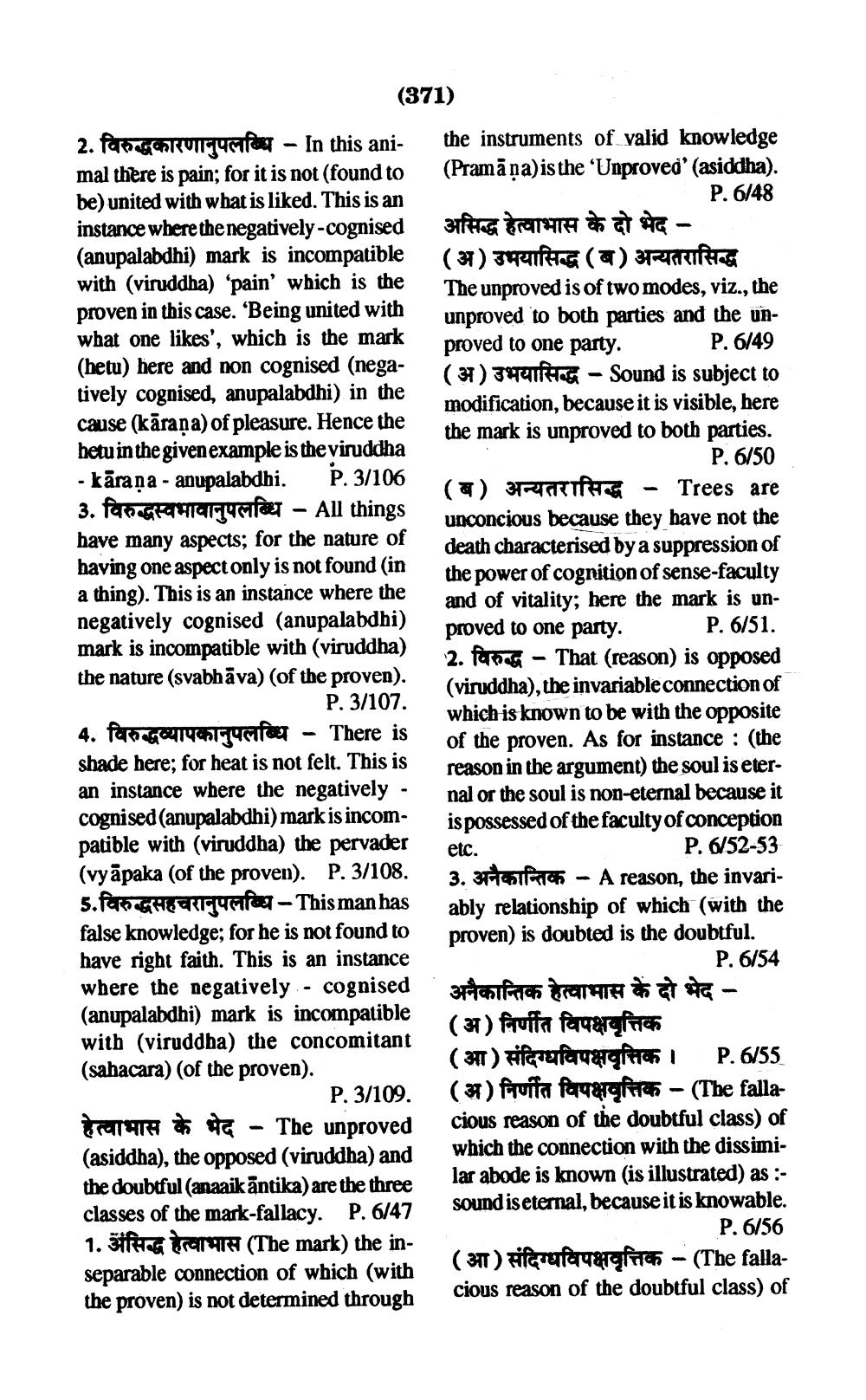________________
P. 3/106
2. विरुद्धकारणानुपलब्धि - In this animal there is pain; for it is not (found to be) united with what is liked. This is an instance where the negatively-cognised (anupalabdhi) mark is incompatible with (viruddha) 'pain' which is the proven in this case. 'Being united with what one likes', which is the mark (hetu) here and non cognised (negatively cognised, anupalabdhi) in the cause (kāraṇa) of pleasure. Hence the hetu in the given example is the viruddha - kāraṇa- anupalabdhi. 3. विरुद्धस्वभावानुपलब्धि All things have many aspects; for the nature of having one aspect only is not found (in a thing). This is an instance where the negatively cognised (anupalabdhi) mark is incompatible with (viruddha) the nature (svabhava) (of the proven). P. 3/107. There is shade here; for heat is not felt. This is an instance where the negatively cognised (anupalabdhi) mark is incompatible with (viruddha) the pervader (vyapaka (of the proven). P. 3/108. 5. विरुद्धसहचरानुपलब्धि - This man has false knowledge; for he is not found to have right faith. This is an instance where the negatively cognised (anupalabdhi) mark is incompatible with (viruddha) the concomitant (sahacara) (of the proven).
4. विरुद्धव्यापकानुपलब्धि
-
-
-
(371)
·
P. 3/109.
हेत्वाभास के भेद The unproved (asiddha), the opposed (viruddha) and the doubtful (anaaik antika) are the three classes of the mark-fallacy. P. 6/47 1. Sifu Tarara (The mark) the inseparable connection of which (with the proven) is not determined through
the instruments of valid knowledge (Pramāņa) is the 'Unproved' (asiddha). P. 6/48 असिद्ध हेत्वाभास के दो भेद - (अ) उभयासिद्ध (ब) अन्यतरासिद्ध The unproved is of two modes, viz., the unproved to both parties and the unproved to one party. P. 6/49 (अ) उभयासिद्ध - Sound is subject to modification, because it is visible, here the mark is unproved to both parties. P. 6/50
(ब) अन्यतरासिद्ध Trees are unconcious because they have not the death characterised by a suppression of the power of cognition of sense-faculty and of vitality; here the mark is unproved to one party. P. 6/51. 2. for That (reason) is opposed (viruddha), the invariable connection of which is known to be with the opposite of the proven. As for instance: (the reason in the argument) the soul is eternal or the soul is non-eternal because it is possessed of the faculty of conception P. 6/52-53 3. अनैकान्तिक A reason, the invariably relationship of which (with the proven) is doubted is the doubtful. P. 6/54 अनैकान्तिक हेत्वाभास के दो भेद - (अ) निर्णीत विपक्षवृत्तिक
etc.
(आ) संदिग्धविपक्षवृत्तिक । P. 6/55 (अ) निर्णीत विपक्षवृत्तिक - (The fallacious reason of the doubtful class) of which the connection with the dissimilar abode is known (is illustrated) as :sound is eternal, because it is knowable. P. 6/56 (आ) संदिग्धविपक्षवृत्तिक - (The fallacious reason of the doubtful class) of
-
-
-




